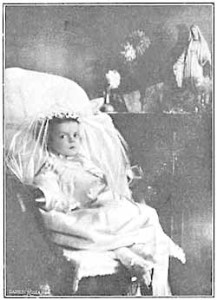Women are More Expensive than Men and Other Language Lessons
![language-758589__480[1]](http://blog.catholicwritersguild.com/wp-content/uploads/2017/09/language-758589__4801-300x81.jpg) A Funny Lesson
A Funny Lesson
Everyone laughed. I was trying to say in Farsi, the Persian language, “Women are stronger than men”, and unfortunately, it came out otherwise. “Geruntar” meaning “more expensive”, innocently rolled off my lips instead of “gavidtar”, or “stronger”.
While chuckling along with everyone else, I hastened to explain in English that I meant women have great endurance. Years later, the incident reminded me that the language of the heart is always generously received by others. You see, I was just learning Farsi and trying hard in a room full of Persians to speak with them in their own language. Since then, with imperfect grammar and pronunciation, I have spoken with relatives and friends in broken words but a whole heart. They never seem to mind my mistakes.
Some of the First Lessons
As a young child, I wanted to learn Tagalog, so I could speak with my Filipino grandmother when she visited. I only managed to say “good morning” and “good night”– it was hard to learn from a book with so many consonants in each word and a dad who was out at sea most of the time and unable to help. When my grandmother did visit, she was pleased with my effort and gently corrected my inexperienced pronunciation.
When our family moved to the United States from England, I had a strong British accent amidst a deeply southern school community. I had to learn that “ya’ll” meant “all of you” and that “kids” were children and not baby goats. In the language of math, I had trouble remembering that a dime was ten cents and not the same as a schilling which was fourteen cents—carrying over 14 cents in a money problem leads to wrong answers.
My mother and father always believed in learning the language and customs of the country in which they lived. And Daddy always said “When in Rome, do as the Romans do, except in sin, of course.” thus, my mother learned French while we were stationed in Villefranche, just outside Nice. When my parents didn’t want my sisters and I to know what they were saying at the dinner table, they spoke in French—of course.
At Barry University in Miami, my friends from Central America patiently listened while I practiced my high school Spanish. It was often frustrating being unable to follow their rapid conversation. When I married my Iranian husband, I made extra efforts to speak slowly and clearly when around his friends. And they were only too happy to translate common words into their language, so I could learn.
Idioms and Accents
Words are not the only difficulty when confronted with a foreign language—accents and idioms present their own challenges. One evening while having dinner with another Iranian/American newlywed couple, some rice fell into the shag carpet. Mansour, Leslie’s husband asked her to go and get the…the…the “rug sucker” when he couldn’t remember “vacuum cleaner”. We all laughed. When my husband still calls his “toes”, “fingers”, I just smile knowingly, as he says “What do you expect from a foreigner”, and gently remind him he is no longer a foreigner after being in this country forty seven years. And thanks to my Dad, I understood that sometimes non-native English speakers mix up “he” and “she”; some countries have no “v” sound, so “adventure” becomes “adwenture”;—you get the idea.
Today, I listen hard to people of many languages and accents around me, seeking to understand and respond with interest and love. My parish has been blessed with priests from Ireland, India, Kenya, Vietnam, Poland and Brazil—each with their wonderful, unique ways of speaking. The key is they all speak that language of the heart. Their love of God, reverence for the Eucharist, and compassion for their parishioners always spoke more loudly than any mispronounced words in a sermon.
“Beloved, since God loved us so much, we also ought to love one another. No one has ever seen God; if we love one another, God lives in us, and his love is perfected in us.” 1 John 4:11-12
The Language that Matters
People everywhere understand the language of love. In the effort, in the trying to reach out to speak and to understand, we connect with others in a way that is beyond words. God speaks to us in a language beyond the written page in scripture. He infuses his spirit of understanding into those who have ears to hear, just as his spirit guides those who proclaim his good news. “Then how does each of us hear them in his own native language?” Acts 2:8
We may not ever experience the magnificent fire of Pentecost or the miraculous courage and comprehension that occurred that day, but we can experience the same spirit. We can reach out with compassion and kindness as we recognize language challenges for those of different heritage than our own. I am convinced that love matters and the heart speaks and hears perfectly. God is love and when we speak his language to others, they understand.
“But blessed are your eyes, for they see, and your ears, for they hear.” Matthew 13:16
Language Fun
If you are interested in languages, try this exercise based on words from 1 John 4:8. See if you can identify the languages listed below for this famous scripture excerpt, “…for God is love.” If you want the answers, I’d be glad to email them to you. Just contact me at [email protected] and put “God is Love” in the subject line. If you have language stories of your own you’d like to share, feel free to leave your comment.
| From 1 John 4:8 |
| · for God is love – English
|
| · denn Gott ist Liebe
|
| · car Dieu est amour
|
| · vì Thượng Đế là tình yêu thương
|
| · for Gud er kjærlighet?
|
| · waayo, Ilaah waa jacayl
|
| · pentru că Dumnezeu este dragoste
|
| · sapagkat ang Diyos ay pag-ibig
|
| · sepse Perëndia është dashuri
|
| · pues Dios es amor
|
| · he aroha hoki te Atua
|
| · mert Isten maga a szeretet
|
| · gdyż Bóg jest miłością
|
| · quoniam Deus caritas est
|

 Paula Veloso Babadi
Paula Veloso Babadi!["Alzheimer's Patient" by Gelonida (Own work) [GFDL or CC BY 3.0], via Wikimedia Commons](http://blog.catholicwritersguild.com/wp-content/uploads/2017/07/Demenzbedrohtes_ich-214x300.png)

![heart-81207__480[1]](http://blog.catholicwritersguild.com/wp-content/uploads/2017/02/heart-81207__4801-300x190.jpg) “But if we acknowledge our sins, he who is just can be trusted to forgive our sins and cleanse us from every wrong.” 1 John 1:9
“But if we acknowledge our sins, he who is just can be trusted to forgive our sins and cleanse us from every wrong.” 1 John 1:9
